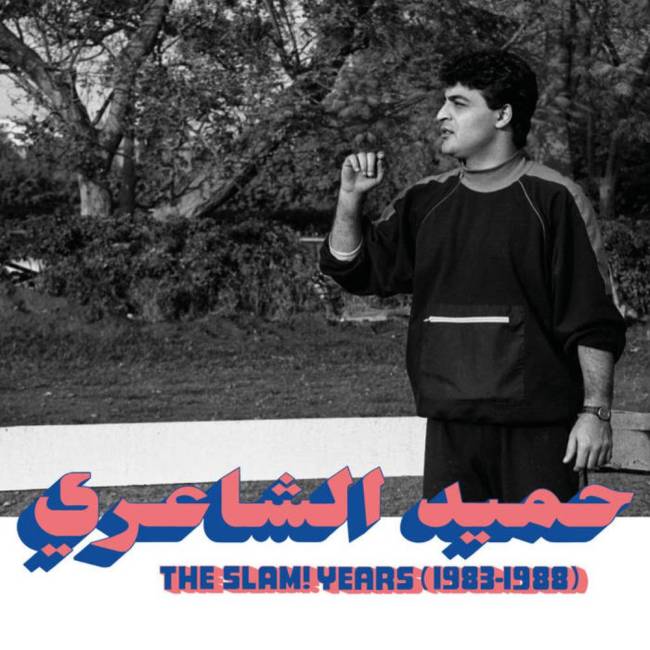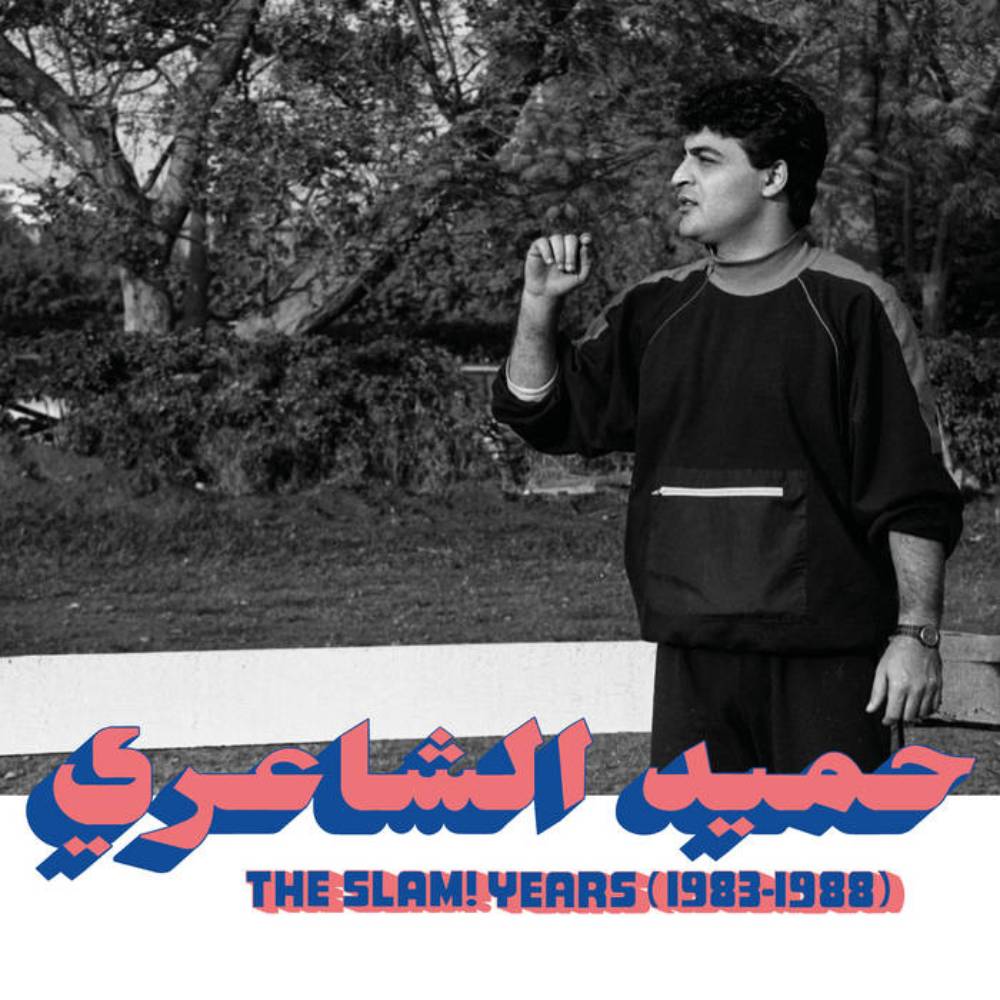 Image via Hamid El Shaeri/Bandcamp
Image via Hamid El Shaeri/Bandcamp
Yousef Srour’s first thing he does when he gets home is check Twitter.
In school, teachers will blandly describe the Nile as the longest river in Africa, traveling north from Sudan to Egypt. What they don’t tell you about are the party boats that pulsate all along the river all through the night. Forget NYC because Cairo is the true “City That Never Sleeps.” Embossed with bright, neon colors that drape every corner of the boat, these nightly cruises blast Egyptian pop music that rumbles throughout the vicinity, across the 6th October Bridge and up and down the piers. Hamid Al-Shaeri makes music for the people on these cruises. Light and visceral, his voice glides like a whisper navigating the current; the electric guitar, the electric piano, the synthesizers – his band captures a galvanic soundscape that uses the Nile River as its electrical conductor.
Habibi Funk 018: The SLAM! Years (1983 – 1988) is a glimpse into Egypt’s sound during the early years of Hosni Mubarak’s regime, which lasted from 1981 to 2011. The project is a tribute to one of the most influential artists to exist within Arabic pop, Hamid Al-Shaeri, and the countless songs he recorded during the ’80s on SLAM! Records, founded by Hany Sabet in the early ’80s. With the aid of Egypt-based distributor Sonar Ltd., SLAM! Records was a Cairo-based imprint that propelled the careers of the country’s native alt-pop stars, from Hakim to Hanan to Hamid Al-Shaeri.
After the assassination of President Anwar Sadat, Hosni Mubarak brought the country into a new light, bringing back support for Palestine in Egyptian politics and promises of affordable housing, medicine, and clothing throughout the country. With a deceivingly bright future in sight for Egypt, artists found futurism through electricity – electric guitars and synthesizers to match the neon lights of Cairo’s nightlife, from the party boats on the Nile to the Tuk Tuks and taxis that overrun the streets.
Hamid Al-Shaeri was a pioneer of the Arabic synth-pop that evolved out of this time. His songs play out like love letters, delivered in the form of ballads and psychedelic instrumentation that features whirring synthesizers, the Oud, and heavy electric guitar. Born in Benghazi, Libya in 1961, Al-Shaeri was born to a Libyan father and an Egyptian mother. A natural singer, Al-Shaeri never had intentions of becoming a pop superstar, but his music blended Western sounds with traditional Arabic songwriting that gave it an international appeal.
Al-Shaeri’s first works were heavily influential in Egypt, especially in Al Jeel music. Blending together foreign rock and roll, pop and Sha’abi music (directly translating to “music of the people”), Al-Shaeri made music with simpler lyrics revolving around passion and grief. At the time, Egypt had been sprung with classical music and funk artists, but artists were slow to bring dance/pop into the country’s musicality. As a listener, these few words carry simple metaphors that instill a sense of beauty from the natural world.
Hamid Al-Shaeri was first featured on Habibi Funk 007: An Eclectic Selection of Music from the Arab World with his song, “Ayonha,” which is also featured on Habibi Funk 018. As Habibi Funk’s first dip into his sound, the hook is elegant, spoken like a lover untampered by the digital world. “عيونها (عيونها) لون البحر” (Translated: “Her eyes are the color of the sea.”) When lyrics like that spread on the radio, through the speakers of taxis throughout the streets, warmth exhibits itself. A country that is typically stricken with blistering summers and temperate winters rarely gets the comfort of enjoying warmth, but Al-Shaeri’s synthesizers make the heat bearable with their cool undertone, like a light ocean breeze that disperses the worst of the heat.
SLAM! had the majority of the label’s releases on cassette, so Habibi Funk took it upon themselves to rediscover the music and find the long-lost songs that Al-Shaeri released past his debut album on the record label. The entire compilation from Hamid Al-Shaeri’s SLAM! years is mesmerizing, switching chords to intermix funk with new wave electronica. The music is attractive and dreamy, equal parts disco and pop. The strums are exciting on songs like “Yekfini Nesma’ Sotak” and “Reet,” with the wooden whistle of a ney (the transverse flute) and the synthesizers squealing to an unethical degree, so much so that the sound becomes addictive. The sound is reminiscent of an electronica-driven Herbie Hancock in his albums Mr. Hands and Future Shock, which had a parallel use of the electronic keyboard and synthesizers.
Al-Shaeri’s music comes from a place of rebirth. In the vocal elements, he allows his voice to be subdued by the instrumentation, so the psychedelic nature of his instruments and his simple live- drum patterns take full control of the swing of the music. He scats a bit on “Oyoun Houriyat” and “Shantet Safar,” eliciting emotion without focusing on his lyrics at all. Despite the analog-fuzz that comes with being studio quality material, the music feels slightly unrehearsed, leaving a human touch to each take that makes the album. He paints soundscapes with hooks and drawn-out notes that make his music easy to sing along to.
Texturally, the music sounds like a glitch at the disco. Where Western pop music can find itself in rigid song structures, Arabic pop music and Hamid Al-Shaeri specifically attempted to introduce the improvisation of jazz into his new wave, synth-pop. On “Maktoub Aleina,” the piano riffs seem sporadic and the synthesizer breaks feel free-form, playing whatever feels right in the moment, allowing random, traditional Egyptian instruments to whizz in the background like a drum circle that keeps on adding to itself. The music laid the foundations for Egyptian music to transition into Mahraganat in the early 2000s, furthering Egyptians experimentation into electronic dance music, hip-hop, and a callback to Sha’abi music.
Hamid Al-Shaeri’s influence has been indoctrinated into the beauty of the country, and with the aid of Habibi Funk, we’re seeing his own personal revival. Since the release of Habibi Funk 007, Hamid Al-Shaeri has been able to reinstate his legacy as a leader within the country’s music scene, receiving critical acclaim from outlets such as Bandcamp and Pitchfork, with “Ayonha” described as “the most arresting track” on Habibi Funk’s seventh compilation. As Egyptian trap music continues to evolve hip-hop in Egypt from its roots in Mahraganat, this becomes a side effect of Al-Shaeri’s legacy – combining traditional instrumentation with electronica to create something utterly brand new.

